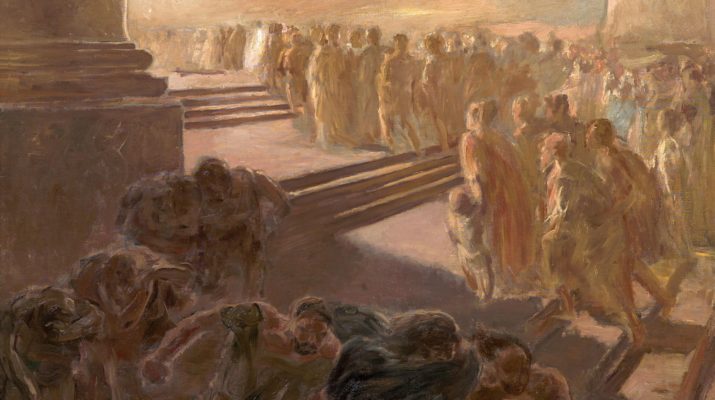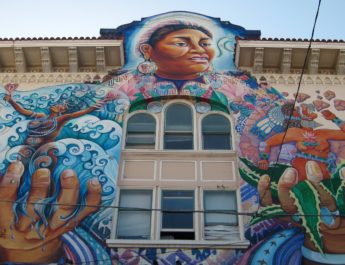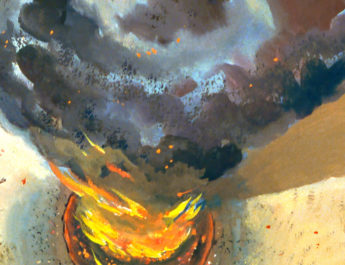John 2:14-22
A Women’s Lectionary – Proper 27
14 In the templeA he foundB people sellingC cattle,D
A “temple” = hieron. From hieros (sacred, something sacred, temple, holy, set apart; something consecrated to a god). This is the word for temple.
B “found” = heurisko. This is to find, learn, or obtain. It is to discover something, which generally implies a period of searching for it. This is to find in a literal or figurative sense. This is where the word “heuristic” comes from.
C “selling” = poleo. This is to barter or sell. It can also refer to the thing that is sold.
D “cattle” = bous. 8x in NT. Perhaps from bosko (to feed or pasture a flock; figuratively, to nourish spiritually) This is a cow, ox, or bull.
sheep,E and dovesF and the money changersG seatedH at their tables.
E “sheep” = probaton. Probably from probaino (to go forward literally or to advance in years); {from pro (before, ahead, earlier than, above) + the same as basis (a step, pace, foot); {from baino (to walk, to go)}}. This is literally easily led and so a sheep or another grazing animal. Also use figuratively of people who are led easily.
F “doves” = peristera. 10x in NT. This is dove or pigeon.
G “money changers” = kermatistes. 1x in NT. From kerma (a slice, clipping, coin); from keiro (to cut off, shear like hair). This is someone who handles money.
H “seated” = kathemai. From kata (down, against, throughout, among) + hemai (to sit). This is to sit, be enthroned, or reside.
15 MakingI a whipJ of cords,K he droveL allM of them out of the temple, with the sheep and the cattle.
I “making” = poieo. This is to make, do, act, construct, abide, or cause.
J “whip” = phragellion. 1x in NT. From phragelloo (to whip or scourge – a whipping as a punishment given in public); from Latin flagellum (a whip); from flagrum (to whip or scourge); from Proto-Indo-European bhlag- (to strike). This is a whip or lash used to punish in public. See https://en.wiktionary.org/wiki/flagellum.
K “cords” = schoinion. 2x in NT – the whip Jesus makes to cleans the Temple in John 2:15 & the ropes of the boat in Acts 27:32. From schoinos (a rush plant). This is a cord or rope that is twined from rushes.
L “drove” = ekballo. From ek (from, from out of) + ballo (to throw, cast, place, put, drop). This is to throw, put out, produce, expel, banish. It is eject in a literal or figurative sense.
M “all” = pas. This is all or every.
He also poured outN the coinsO of the money changersP and overturnedQ their tables.R
N “poured out” = ekcheo. From ek (from, from out of) + cheo (to pour). This is something poured out in a liberal fashion. So, it is gushing, spilling, or shedding.
O “coins” = kerma. Related to “money changers” in v14. 1x in NT. See note G above.
P “money changers” = kollubistes. 3x in NT. From kollubos (a small coin); probably related to kollourion (a salve or poultice for the eye); see kollurion (bread roll or a poultice for the eye in that shape); {probably from kollix (bread roll) or kollao (to glue together; joining, spending time with, or being intimately connected to; can be used for marriage, joining the church, clinging, or adhering to something; can also be used medically for uniting wounds); {from kolla (glue)}}. This is one who deals in coins – a money changer who exchanged Gentile currency for Jewish.
Q “overturned” = anatrepo. 3x in NT. From ana (up, again, back, among, between, anew) + trope (turning, shifting, a revolution; figuratively, a variation); {from trepo (to turn)}. This is to overturn, overthrow, destroy, or upset. It is overturn in a literal or figurative sense – including upset as in bother.
R “tables” = trapeza. 15x in NT. Probably from tessares (four; figuratively, can mean total inclusion or universality) + peze (by foot or land) or pezos (by foot or land); {from pous (foot)}. This is a table – whether for eating or conducting business. Literally, four feet. This is where the word “trapeze” comes from.
16 He told those who were selling the doves, “TakeS these things out of here! Stop making my Father’sT houseU a marketplace!”V
S “take” = airo. This is to lift up in a literal or figurative sense. So, it could mean to lift, carry, or raise. It could also imply lifting something in order to take it away or remove it. Figuratively, this can be used for raising the voice or level of suspense. It can mean sailing off as raising the anchor. It can also correspond to a Hebrew expression for atonement of sin (lift/remove sin).
T “Father’s” = pater. This is father in a literal or figurative sense. Could be elder, senior, ancestor, originator, or patriarch.
U “house” = oikos. This is house – the building, the household, the family, descendants, the temple.
V “marketplace” = oikos + emporion. Literally, “a house of trade.” Oikos is the same as “house” in v16. See note U above. Emporion is 1x in NT. From emporos (merchant or trader; one who travels by ship or more broadly one journeying); {from en (in, on, at, by, with, among) + the base of poreuomai (to go, travel, journey; transportation something from one place to another; focuses on the personal meaning given to getting to the destination); {from poros (passageway, ford)}}. This is a market, a place of business or trading. It is also share as root with “emporium.”
17 His disciplesW rememberedX that it was written,Y “ZealZ for your house will consumeAA me.”
W “disciples” = mathetes. From matheteuo (to make a disciple of); from manthano (to learn key facts, gain knowledge from experience; generally implies reflection as part of the learning process); from math– (thinking things through). This is a disciple, learner, or student. It is where we get “mathematics” from.
X “remembered” = mimnesko. From mnaomai (to remember; by implication give reward or consequence); perhaps from meno (to stay, abide, wait, endure). This is to remind or remember. It is memory through an active, intentional process or being mindful of. It is not incidentally or accidentally remembering.
Y “written” = grapho. This is to write or describe. It is where the word “graphic” comes from.
Z “zeal” = zelos. 16x in NT– 6x in a positive sense (zeal for God) & 10x in a negative sense (jealousy/strife). Perhaps from zeo (to boil, be hot, ferment, bubble, boil, or glow; used figuratively for being fervent or earnest). This is eagerness or zeal on the one hand or rivalry and jealousy on the other. The verb is meant to echo the sound of boiling water and so it depicts burning emotion that bubbles over. So, burning anger or burning love.
AA “consume” = katesthio. 15x in NT. From kata (down, against, throughout, among) + esthio (to eat or figuratively to devour or consume like rust). This is to eat up, to consume totally so that there is nothing left. It can also be to annoy, injure, or squander.
18 The JewsBB then said to him, “What signCC can you showDD us for doingEE this?”
BB “Jews” = Ioudaios. From Ioudas (Judah, Judas); from Hebrew Yehudah (Judah, son of Jacob, his tribal descendants, a name for the southern kingdom. Literally, it means praised); probably from yadah (to throw one’s hands into the air in a gesture of praise); from yad (hand). This is Jewish, a Jew, or Judea.
CC “sign” = semeion. From the same as semaino (to give a sign, signify, indicate, make known); from sema (a sign or mark). It is literally a sign of any kind. It also refers to a sign given by God to confirm or authenticate a message or prophecy. It is not necessarily miraculous, but it can be. The Gospel of John generally uses this word instead of miracle.
DD “show” = deiknumi. This is to show in a literal or figurative sense so it can be to teach, bring, or point out.
EE “doing” = poieo. Same as “making” in v15. See note I above.
19 JesusFF answered them, “DestroyGG this temple,HH and in threeII daysJJ I will raise it up.”KK
FF “Jesus” = Iesous. From Hebrew Yehoshua (Joshua, the Lord is salvation); {from YHVH (proper name of the God of Israel; the self-existent and eternal one); {from havah (to become) or from hayah (to come to pass, become, be)} + yasha (to deliver, defend, help, preserve, rescue; properly, to be open, wide or free, which implies being safe. So, in a causative sense, this is to free someone)}. This is Jesus or Joshua in Greek – the Lord saves or the Lord is salvation.
GG “destroy” = luo. This is to loose, release, or untie. Figuratively, it can mean to break, destroy, or annul. This is releasing what had been withheld.
HH “temple” = naos. From naio (to dwell, inhabit). This is a place for God (or a god) to live – a sanctuary, shrine, or temple. It is a place for God or a god to manifest. For the Jewish Temple, it is used of the Temple itself and the two inner chambers.
II “three” = treis. This is three.
JJ “days” = hemera. Related to “seated” in v14. Perhaps from hemai (see note H above). This is day, time, or daybreak.
KK “raise…up” = egeiro. This is to awake, raise up or lift up. It can be to get up from sitting or lying down, to get up from sleeping, to rise from a disease or from death. Figuratively, it can be rising from inactivity or from ruins.
20 The Jews then said, “This temple has been under constructionLL for fortyMM-sixNN years,OO and will you raise it up in three days?”
LL “been under construction” = oikodomeo. Related to “house” in v16. From oikos (see note U above) + domeo (to build). This is to build a house or be a house builder. Figuratively, it can mean to edify or encourage, be strong or embolden.
MM “forty” = tessarakonta. Related to “tables” in v15. From tessares (see note R above). This is forty. Figuratively, it alludes to a time of trial or a long interval.
NN “six” = hex. 13x in NT. This is six. It is part of where “hexagon” comes from.
OO “years” = etos. This is year or age.
21 But he was speaking of the temple of his body.PP 22 After he was raised from the dead,QQ his disciples remembered that he had said this, and they believedRR the scriptureSS and the wordTT that Jesus had spoken.
PP “body” = soma. Perhaps from sozo (to save, heal, rescue); from sos (safe, well, rescued). This is body or flesh. It can be body in a literal or figurative sense (as the body of Christ). This is where the word “somatic” comes from.
QQ “dead” = nekros. Perhaps from nekus (corpse). This is dead or lifeless, mortal, corpse. It can also be used figuratively for powerless or ineffective. It is where the word “necrotic” comes from.
RR “believed” = pisteuo. From pistis (faith, faithfulness, belief, trust, confidence; to be persuaded or come to trust); from peitho (to have confidence, urge, be persuaded, agree, assure, believe, have confidence, trust). This is to believe, entrust, have faith it, affirm, have confidence in. This is less to do with a series of beliefs or doctrines that one believes and more to do with faithfulness, loyalty, and fidelity. It is trusting and then acting based on that trust.
SS “scripture” = graphe. Related to “written” in v17. From grapho (see note Y above). This is literally writing, a document. In the New Testament, this is always used for scripture.
TT “word” = logos. From lego (to speak, tell, mention). This is word, statement, speech, analogy. It is a word that carries an idea or expresses a thought, a saying. It could refer to a person with a message or reasoning laid out in words. By implication, this could be a topic, line of reasoning, or a motive. It can be used for a divine utterance or as Word – Christ.
Image credit: “Christ Driving the Money-Changers from the Temple” by Gaetano Previati, by 1920.




